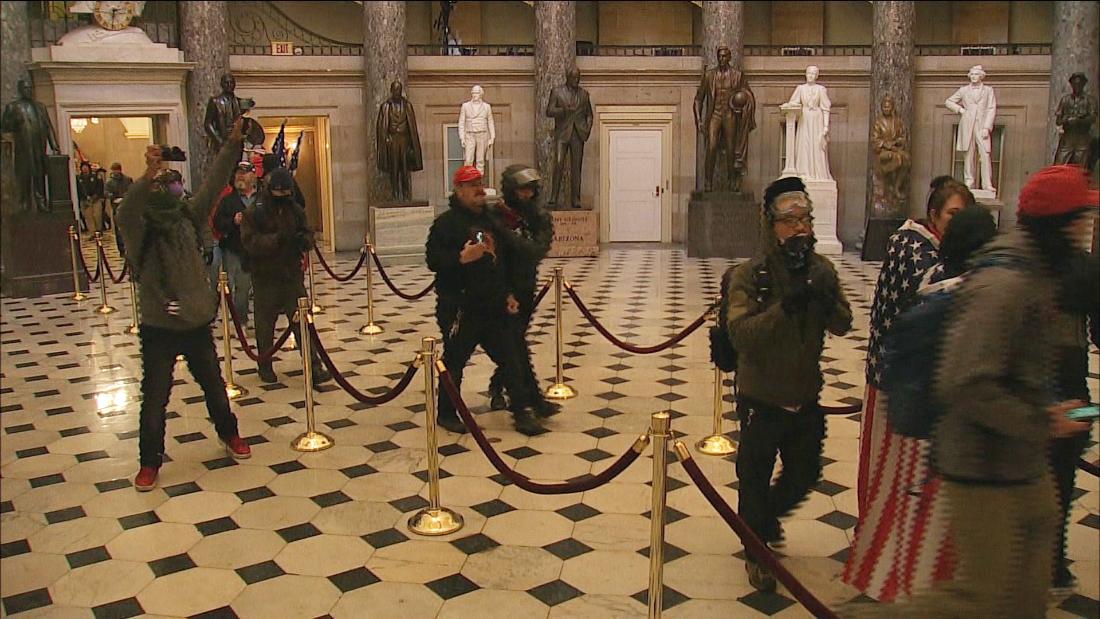The idea of an insurrection is unprecedented in the modern history of the United States, and the possibility that legislators or allies within the Capitol are helping only adds to the uncertainty and concern about the event and what is to come.
At least one protest organizer said he coordinated with three House Republicans. There are unverified accusations of a “reconnaissance” mission the day before the attack. And more than a dozen US Capitol police officers are under internal investigation for allegedly helping protesters.
While President Donald Trump’s role in inciting violence is clear, there are some initial indications and accusations that other insiders may have helped the crowd more actively.
Ali Alexander, a right-wing conspiracy theorist who led one of the “Stop The Steal” groups, said in a live video that he planned the rally that preceded the riot with three Republican lawmakers: Reps. Paul Gosar and Andy Biggs of Arizona, and Rep. Mo Brooks of Alabama.
Brooks spoke at the rally before Trump took the stage and urged the crowd to “start taking names and busting out.” In a 2,800-word statement about his involvement, Brooks said he was just telling the crowd to fight at the polls. (Brooks also revealed that a White House official called him the day before and invited him to speak at the rally.)
CNN previously reported that Gosar joined the Alexander group in the past few months. A spokesman for Biggs told CNN that he never met or worked with Alexander.
Alexander said he expected his “mob” to pressure lawmakers to block President-elect Joe Biden’s victory at the Electoral College. After the mutiny was suppressed, the three lawmakers voted to reject Biden’s electoral votes in Arizona and Pennsylvania. His effort failed.
“These three members of Congress are going to need a lawyer, very quickly,” former Republican Congressman Charlie Dent, CNN contributor, told CNN’s Erin Burnett on Wednesday, adding that he thinks lawmakers will face scrutiny from prosecutors. and the House Ethics Committee.
Alleged ‘reconnaissance’ mission
Congresswoman Mikie Sherrill, a Democrat from New Jersey, made a noise Tuesday night when
accused Anonymous Republican lawmakers who helped rioters by taking them to the Capitol the day before for a sort of “reconnaissance” mission. CNN has yet to verify these allegations.
Sherrill said there were “members of Congress who had groups passing by the Capitol that I saw on January 5 for recognition the next day.” CNN has repeatedly asked Sherrill’s office for details about his accusation, but they have not provided any additional information.
She is a former Navy helicopter pilot and federal prosecutor, and is seen as a moderate member of the Democratic bench, not an arsonist who would make accusations without merit. She said on Wednesday that she was “requesting an investigation” with “certain agencies”, probably to examine possible coordination between Republican lawmakers and protesters.
Separately, Republican Representative Lauren Boebert of Colorado was criticized for tweeting about the whereabouts of Mayor Nancy Pelosi as the attack unfolded. Boebert, who is affiliated with the QAnon movement and regularly spreads right-wing conspiracy theories, tweeted that Pelosi had been “removed from (the Chamber’s) chambers” while the protesters were still in the building.
Prosecutors investigate conspiracy charges
More than 70 people have already been indicted for federal crimes related to the attack. Most publicly reported cases involve people who fought with police officers on Capitol Hill, made violent threats against Democrats or were found near the compound with guns or bombs.
Prosecutors have yet to accuse any of Trump’s supporters of coordinating with Republican lawmakers or sympathetic police, but the massive investigation is still in its early stages.
“We are looking at cases of significant crimes linked to sedition and conspiracy,” Michael Sherwin, the United States attorney in Washington, DC, told reporters on Tuesday, without specifically saying whether any lawmakers or police officers were under investigation.
But Sherwin added, “Our office has organized an attack force of very senior national security prosecutors and public corruption prosecutors. His only marching orders are to build charges of sedition and conspiracy related to the most heinous acts that have occurred on Capitol Hill.”
Internal police and military aid
At least two US Capitol officers have already been suspended and at least 10 more are under investigation for allegedly playing some role in the uprising, CNN reported.
There was immediate speculation after the attack that some sympathetic policemen may have helped the troublemakers, given the fact that the noisy and sometimes violent crowd seemed to circulate through the Capitol complex with little resistance. A rowdy man even posed for a selfie with a police officer.
Current and former US military personnel also participated in the insurrection, according to press reports and court records. One of the men who infiltrated the Senate during the attack is a retired Air Force lieutenant colonel, and the Army is investigating a psychological operations officer who led a group of North Carolinians to Trump’s rally before the attack.
Ashli Babbitt, the 35-year-old woman who was fatally shot by the police while trying to break into the Chamber chamber, was an Air Force veteran who was later consumed by conspiracy theories.
CNN’s Daniella Diaz and Annie Grayer contributed to this story.
